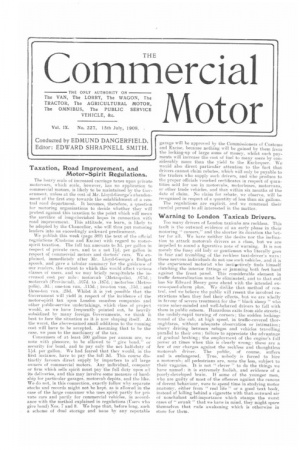Taxation, Road Improvement, and Motor-Spirit Regulations.
Page 1

If you've noticed an error in this article please click here to report it so we can fix it.
The heavy ,cale of increased carriage taxes upon private motorcars, which scale, however, has no application to commercial motors, is likely to be maintained by the Government, unless at the cost of Mr. Lloyd-George's abandonment of the first step towards the establishment of a central road department. It. becomes, therefore, a question for motoring organizations to decide whether they 1611 protest against this taxation to the point which will mean the sacrifice of long-cherished hopes in connection with road improvement. This attitude, we learn, is likely to be adopted by the Chancellor, who will thus put motoring leaders into an exceedingly awkward predicament. We publish this week (page 389) the text of the official regulations (Customs and Excise) with regard to motorspirit taxation, The lull tax amounts to 3a. per gallon in respect of private cars, and to a net 14d. per gallon in respect of commercial motors and doctors' cars. We explained, immediately after Mr, Lloyd-George's Budget fipeech, and gave a tabular summary for the guidance of our readers, the extent to which this would affect various classes of users, and we may briefly recapitulate the increased cost per mile: motorcab (Metropolis). .075d. ; motorcab (Provincial). .107d. to .187d. ; motorbus (Metropolis), .3d.; one-ton van, .115d.; two-ton van, .15d.: and three-ton van, .23d. Whilst it is yet possible that the Government will yield in respect of the incidence of the motor-spirit tax upon London omnibus companies and other public-service undertakings, which class of project would, as we have frequently pointed out, be heavily subsidized by many foreign Governments, we think it best to face the situation as it is /IOW shaping itself. At the worst, the above-named small additions to the running cost will have to be accepted. Assuming that to he the case, we pass to the machinery of the tax.
Consumers of at least 500 gallons per annum are, we note with pleasure, to be allowed to " give bond." or security for bond, and to pay only the net half-duty of Lld. per gallon. We had feared that they would, in the first instance, have to pay the full 3d. This course distinctly favours direct supply by importers to all large owners of commercial motors. Any individual, company or firm which sells spirit must pay the full duty upon a its deliveries, and this may involve some measure of hardship for particular garages, motorcab depots, and the like. We do not, in this connection, exactly follow why separate stocks and records might not be kept, as is allowed in the. case of the large consumer who uses spirit partly for private cars and partly for commercial vehicles, in accordance with the method explained in regulations (Users who give bond) NM?. 7 and 8. We hope that, before long, such a scheme of dual storage and issue by any reputable garage will be approved by the Commissioners of Customs and Excise, because nothing will be gained by them from the locking-up of large sums of money, whilst such payments will increase the cost of fuel to many users by considerably more than the yield to the Exchequer. We would also direct particular attention to the fact that drivers cannot claim rebates, which will only be payable to the traders who supply such drivers, and who produce to the proper officials vouched certificates in respect of quantities sold for use in motorcabs, motorbuses, motoryans, or other trade vehicles, and that within six months of the date of claim. No claim for rebate, we observe, will be recognized in respect. of a quantity of less than six gallons. The regulations are explicit, and we commend their careful perusal to all ioterested in the matter.




















